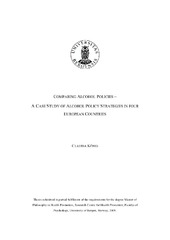| dc.description.abstract | PURPOSE: The purpose of this study is to better understand differences, similarities and trends of national-level alcohol policies in different parts of Europe as viewed in their contexts and with a focus on the policy-making process and influencing factors. METHOD: This case study included a combination of document and interview data and considered four European countries with different traditions concerning drinking culture, geographical location and policy approach. The countries were selected through purposive sampling. National-level official policy documents were collected using an openly accessible database. Four interviews with a national expert from each of the study countries were conducted by telephone, recorded and transcribed. Data analysis centred on a variety of alcohol policy strategies and factors influencing the policy-making process. RESULTS: The data show that all four countries have implemented a variety of complementary alcohol policy strategies including both preventive and regulatory strategies. However, alcohol policies are complex and the findings show differences across the four countries in priorities, type and number of preventive versus regulatory strategies, their implementation and enforcement, and their strictness. The results furthermore illustrate the variety of actors and their level of influence in the policy process. CONCLUSION: Alcohol consumption and policies are embedded into complex social, cultural, historical and political circumstances and are greatly influenced by these contexts. Despite existing differences, a combination of a variety of alcohol policy strategies, which are in accordance with the five health promotion strategies, is applied in all four countries. European recommendations or regulations provide guidance for national level alcohol policies on the one hand, but might also hinder advances for alcohol policies from a public health perspective. It is necessary to consider all policy sectors at all levels in order to build healthy public policy. The policy-making process involves many actors with competing interests, which makes it necessary to advocate for alcohol policy from a public health perspective. | en_US |
